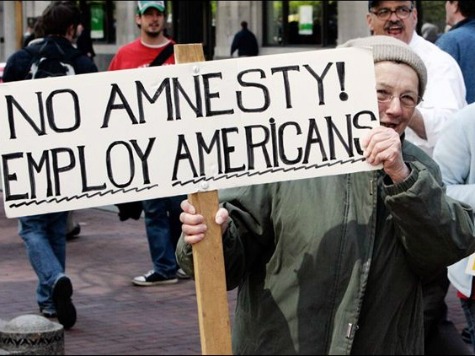
Amnesty legislation may hurt Silicon Valley women, blacks, and Latinos in the high-tech industry even more, as they are already being hired in fewer and fewer numbers. However, that has not stopped tech companies from conning the mainstream press into believing that they face a shortage of American high-tech workers.
But the deeper con, writes Joel Kotkin in the Daily Beast, is that tech companies have convinced the public that they are somehow above profit motives, even as they lobby Congress for amnesty to solve a problem that doesn’t exist.
“It may shock much of the media, who have generally genuflected towards these companies, and much of the public, that has been hoodwinked into thinking the Valley oligarchs represent a better kind of plutocrat–but the truth is they are a lot like the old robber barons,” he writes, while emphasizing that Silicon Valley “is out for profit, not to change the world.”
Facebook co-founder Mark Zuckerburg has led the tech industry in aggressively pushing for amnesty legislation that the Congressional Budget Office determined would lower the wages of American workers, partly because the legislation would double or even triple the number of H1-B visas and other guest-worker permits. Doing so would make jobs that are already scarce for blacks, Latinos, and women in Silicon Valley even more so.
Kotkin cited a report in the San Jose Mercury News that found that the “unique diversity of Silicon Valley is not reflected in the region’s tech workplaces–and the disparity is only growing worse,” as blacks, Hispanics, and women employees are dwindling in the high-tech industry.
The Mercury News also noted that “the trend is striking in a region where Hispanics are nearly one-quarter of the working-age population–five times their percentage of the computer work force–and when dual-career couples and female MBAs are increasingly the norm:”
An analysis by the Mercury News of the combined work force of 10 of the valley’s largest companies–including Hewlett-Packard, Intel, Cisco Systems, eBay and AMD–shows that while the collective work force of those 10 companies grew by 16 percent between 1999 and 2005, an already small population of black workers dropped by 16 percent, while the number of Hispanic workers declined by 11 percent. By 2005, only about 2,200 of the 30,000 Silicon Valley-based workers at those 10 companies were black or Hispanic. The share of women at those 10 companies declined to 33 percent in 2005, from 37 percent in 1999. There was also a decline in the share of management-level jobs held by women.
In addition, of “top managers and officials in the Silicon Valley offices of the 10 large companies in 2005, 296 were black or Hispanic, a 20 percent decline from 2000,” and the “share of managers and top officials who are female at those 10 big Silicon Valley firms slipped to 26 percent in 2005, from 28 percent in 2000.”
Kotkin also referenced the “outsourcing of labor to lower paid foreign workers, the so called ‘techno-coolies,'” that keep wages down.
“The tech giants claim that they hire cheap workers overseas because of a critical shortage of skilled computer workers, but that doesn’t hold up to serious scrutiny,” he writes. “A 2013 report from the labor-aligned Economic Policy Institute found that the country is producing 50% more IT professionals per year than are being employed. Tech firms, notes EPI, would rather hire ‘guest workers’ who now account for one-third to one half of all new IT job holders, largely to maintain both a lower cost and a more pliant workforce.”
The Mercury News also pointed out Silicon Valley critics “blame the government for allowing powerful Silicon Valley companies to rely so heavily on foreign-born workers on H-1B visas.”
Moreover, according to government figures, “between 1999 and 2005, Hispanics were a declining share of the work force in a majority of the 10 large Silicon Valley companies… slipping to 5.2 percent of all workers at the 10 companies in 2005, from 6.8 percent in 1999,” while “the black share of the work force at the 10 companies dropped to 2.1 percent, from 2.9 percent.”
Importing more workers when there is not even a shortage would further exacerbate these numbers for American workers.
Yet, though numerous studies have been debunking the notion peddled by the high-tech industry that there is a shortage of American high-tech workers, the high-tech lobbies and the mainstream press have not stopped from relentlessly perpetuating the myth in promoting amnesty legislation.

COMMENTS
Please let us know if you're having issues with commenting.